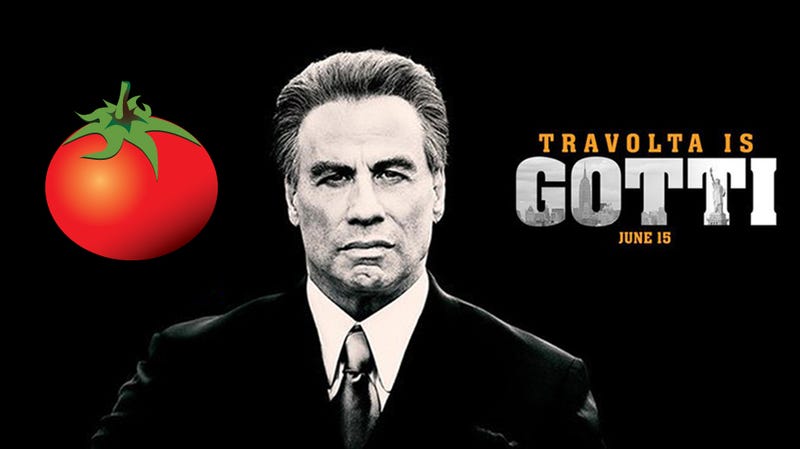 Image: EFO Films
Image: EFO Films
Last week, Gotti joined the short list of films to that have received a zero percent “fresh” rating from critics on Rotten Tomatoes. Still, it had an oddly high rating from audiences, and one of the film’s financiers, MoviePass, decided to turn that into a marketing opportunity. The more people looked, the more it seemed like the audience rating was being manipulated, but Rotten Tomatoes says there’s nothing to see here.
Screen Junkies film critic Dan Murrell was the first to point out that something fishy was going on with Gotti’s audience rating. On Monday, he wrote on Twitter, “Some party involved with Gotti artificially manipulated the audience scores and they’re now using it as a marketing strategy. The numbers don’t make sense.” Murrell was annoyed that Gotti was now promoting itself with an ad campaign claiming audiences loved it but critics didn’t and everyone should decide for themselves. Murrell took issue with pitting salt of the Earth audiences against snobby out-of-touch critics, but he also thought the audience rating was bullshit.
When Murrell first noticed that something might be up, Gotti had a 78 percent fresh rating from audiences. That number has fallen slightly to 69 percent today. One thing that’s strange is that 7,063 users have voiced their opinion about the film that made around $1.9 million over the weekend. The weekend’s winner at the box office, The Incredibles 2, has 7,852 user ratings and pulled in $183 million over the same time period. That certainly seems like a lot more people who saw Gotti really wanted to let the world know that it’s not awful.
Murrell also took issue with the suspicious users who wrote reviews for the film on Rotten Tomatoes. A helpful Redditor summed up the data they dug through:
I went to take a look at the written reviews on RT, and of the first 58 reviewers with an available profile, 45 had created their account on June 2018;
Out of these 45, 32 have only reviewed Gotti, 10 reviewed Gotti and another movie (7 times it was American Animals [another film owned by MoviePass]) and 3 had more than 3 reviews.
Of the remaining 13 accounts 8 looked normal and 5 had created their account in December (TLJ?) so those were probably legit.
All signs seemed to indicate that someone was trying to bump up the audience rating for the film—and if it wasn’t MoviePass, the subscription theater service certainly saw an opportunity for a cheeky marketing opportunity.
We asked Rotten Tomatoes if it had noticed any unusual activity with user ratings for Gotti, and a spokesperson told us, “We closely monitor our platforms and haven’t determined there to be any problems. All of the reviews were left by active accounts.” We asked if it’s common to find studios manipulating user reviews but our question was ignored. We also asked MoviePass for comment on the swirling rumors and received a bizarre reply that boils down to a denial of the marketing team’s involvement. “The MoviePass marketing team is only engaged in sending promotional emails and push notifications to our users,” a spokesperson said. “We have no further involvement from a marketing perspective and have no insight or information about who is providing the audience reviews to Rotten Tomatoes.”
Regardless of whether MoviePass, friends of John Travolta, or anyone else might be trying to game the Tomatometer, there’s still an interesting dynamic going on here. Hollywood has been complaining that bad Rotten Tomatoes scores harm their box office and that critics are out of touch with the people. Critics also sometimes take issue with the oversimplification of the site’s scoring system. All that’s just to say that Rotten Tomatoes has an interest in defending its system.
But the film-ranking site also has an interest in making MoviePass look bad. Rotten Tomatoes is owned by the online ticketing service Fandango, one of the closest things to a direct competitor that MoviePass has.
Meanwhile, MoviePass is trying to prove to film studios that its service can drive huge amounts of traffic to films that audiences might otherwise skip in the theater. When you’re only paying a small monthly fee for virtually unlimited movies, you’re more willing to take a risk on what you see. MoviePass hopes to collect fees for promoting select films through its app, push notifications, email list, and other levers. I’m sure MoviePass hoped to make more money on Gotti at the box office this weekend, but it reportedly drove 40 percent of the film’s audience to show up. As far as proving the company’s theory that it can get butts in the seats for even the worst film, that’s not a terrible statistic.
With the launch of an ad campaign for Gotti that wears the abysmal reviews from critics as a badge of honor, MoviePass is pulling a card from Netflix’s playbook. Critics hated Netflix’s Will Smith film Bright, but when you can stream it basically for free, morbid curiosity could easily make you hit play. It turned into one of the streaming service’s biggest hits, and executives crowed that “critics are pretty disconnected from the mass appeal.”
We’ll see if Gotti’s antagonistic approach to critics gives it a boost in the long run, but right now, a box office flop is the least of MoviePass’s worries. While it strives to prove it has a viable new business model, the company is burning through cash at an extraordinary rate. It still has a $300 million line of credit that it claims will float it for another 16 months, and it’s going to take more than clever marketing to get Hollywood to start sharing the wealth.
[Dan Murrell, Reddit]